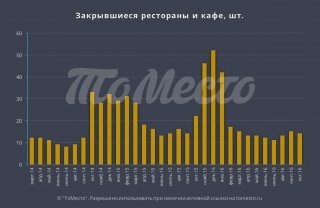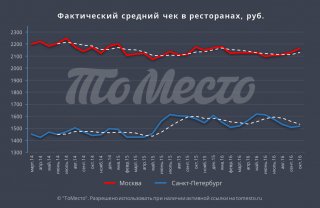
Less Of Restaurant Business
 The St. Petersburg Station Service conducted a study to determine the impact of the crisis on the Moscow and St. Petersburg restaurant market. The statistics cover more than 1,300 secondary and upper price segments, which are continuously cooperating with , and are based on a large number of unique data available to some 850,000 guests (~8, 5 per cent of the economically active population) who have booked the table and have visited the establishment from January 2014 to October 2016.
The St. Petersburg Station Service conducted a study to determine the impact of the crisis on the Moscow and St. Petersburg restaurant market. The statistics cover more than 1,300 secondary and upper price segments, which are continuously cooperating with , and are based on a large number of unique data available to some 850,000 guests (~8, 5 per cent of the economically active population) who have booked the table and have visited the establishment from January 2014 to October 2016.
The end of 2014 quickly restored the notion of currency crisis and cheap hydrocarbons to the Lexicon of the Russians, but did not almost reduce the number of guests in Moscow and St. Petersburg restaurants. New institutions are opened, including in shopping centres, and almost always find their visitors. For example, in the past 12 months alone, more than 150 restaurants, cafes and bars have opened in the capital, and in Petersburg this figure has passed over 100. It's not possible to translate it into an optimistic formula: 2-3 new restaurants a week for each of the cities.
It's not possible to translate it into an optimistic formula: 2-3 new restaurants a week for each of the cities.
Of course, the fall of the rouble could not not have started in the natural selection industry, which confirms the statistics of closed institutions:
While one restaurant was closed on average every 3 days before the crisis, the first wave of economic difficulties had forced many to stop, from October 2014 to March 2015, one facility was closed every day in two capitals. After six months of quiet, one restaurant disappeared every two days, but the second, more intense wave, in November 2015 - January 2016 finally drowned those who failed to adjust to new conditions: up to two institutions a day on the Moscow and Petersburg restaurant map.
In a year and a half, from October 2014 to March 2016, the crisis of "smashing" from a map of at least 250 establishments is more common - about 6 per cent of the restaurant market, which is certainly not a disaster. The guests had not refused to attend restaurants and had distributed to the remaining institutions, compromising the effects of the crisis.
We're not spending less.
The average cheque, the amount spent by one customer, illustrates the same anti-crisis fact: the Rossians are not rushing to economize in restaurants.









